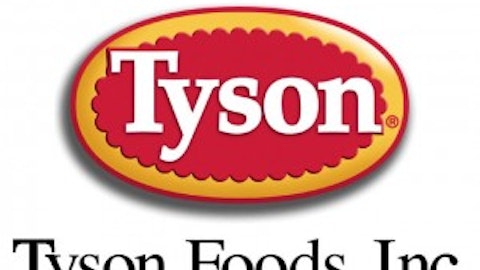Apparently, it’s no longer the U.S. government that Smithfield Foods, Inc. (NYSE:SFD) has to worry about scuttling its purchase by Chinese meat producer Shuanghui International. Analysts say the deal is likely to get approved, albeit with conditions, though the national security fears raised by grandstanding politicians did get some airplay at congressional hearings this past summer.
No, the bigger threat comes from its own investors, namely, private equity firm Starboard Value, its biggest shareholder with a 5.7% stake in the pork processor. It says it plans to vote against the merger, believing the $4.7 billion deal, or $34-per-share offer, does not provide enough value to shareholders, and it seeks more time to pursue other possible options. Including debt, the total value of the acquisition is $7.1 billion.

High on Starboard’s agenda would be the piecemeal sale of the company. It said it has in writing offers for different parts of Smithfield Foods, Inc. (NYSE:SFD)’s business that would total more than the value of Shuanghui’s offer. However, in something of a conciliatory note, the private equity firm said that, while it plans to vote against the merger, if it can’t get a third-party deal together, it will ultimately vote in favor of the sale.
Smithfield Foods, Inc. (NYSE:SFD) is the largest pork processor in the country, with $13.2 billion in annual revenue, and a 28% market share, ahead of No. 2 Tyson Foods, Inc. (NYSE:TSN), which generated $5.3 billion in pork revenue over the past 12 months, and has a 17% share. Brazil’s JBS is third with an 11% share.
Pork remains the fastest-growing protein segment, according to a study by Technomic, which found that the amount of pork sold through foodservice outlets has grown to a record 9.25 billion pounds annually, a 2.6% increase over 2011, and well ahead of the 0.8% increase in average protein growth.
Earlier this year, Seaboard, which gets 30% of its revenues from the other white meat, bought privately held processor Gusto, suggestive of the popularity pork is experiencing.
Tyson Foods, Inc. (NYSE:TSN), which like other processors had been relying upon pork’s renewed sales spurt to prop up its meat business as chicken and beef slipped, was hurt when China and Russia blocked the import of U.S. pork earlier this year because of the use of ractopamine, a growth-promoting drug that increases lean muscle production in hogs and cattle before they’re led to slaughter.
Having lost those markets, and having watched its volumes fall by 2% and 3% in the last two quarters, Tyson Foods, Inc. (NYSE:TSN) announced it would no longer use Zilmax, a drug produced by Merck that’s similar to ractopamine, because of the impact it was having on animal health. Smithfield Foods, Inc. (NYSE:SFD), as a matter of fact, halted the use of ractopamine just before the sale to Shuanghui was announced. Now, Merck has suspended sales of the drug, and other meat producers like Cargill have also said they’ll end their use of the fattening agent.





